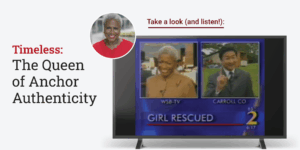Building trust…begins with talk about trust — talk combined with action, to be sure, but talk first of all. We are creatures who talk, and therefore we are thinking, reflective creatures. We don’t just avow our trust, we examine it, and we can thereby create and build it.
Robert C. Solomon and Fernando Flores, building trust in business, politics, relationships and life, p. 43
You begin building trust by talking about it.
The term “fake news” is now baked into our society’s ongoing conversation about news and newscasters, showing up unsolicited even in our research exploring what viewers most value in television news anchor talent.
Following on the 2020 presidential election, we asked news viewers across the country what they valued most in television news anchors. The words “honest” and “trustworthy” combined were mentioned more frequently than any other attribute viewers claim to value. A few months later, when we asked viewers to rank the qualities that most distinguish the anchor(s) they currently choose to watch, “honest and unbiased” topped the list for every demographic category.
That viewers across the board valued these things highly was no surprise. That they felt compelled to raise them so persistently suggested that honesty and trustworthiness are no longer qualities they can take for granted in professional journalists. In an era of fake news and, by association, fake newscasters, it’s a preference they must take pains to state.
Nothing speaks more directly to the success of the fake news narrative than the erosion of trust in media along political party lines. In 2022, Gallup noted that, “Democrats express significantly more trust in news organizations than Republicans. Among Republicans, trust in news continues to decline. New data show that more independents today report distrusting news than ever previously reported. ” The seeds of distrust sown in media have taken deep and partisan root. And even though Gallup asserts that local news organizations are still trusted more than national ones, our studies in local markets show concern about honesty and trustworthiness continues to rise there, too.
If there is any hope of narrowing the tribal divide that’s growing in America, effectively countering the fake news media narrative — somehow sowing trust in place of distrust — will be a critical factor. And if Solomon and Flores are right about the origins of trust, journalists will have to join the conversation and stand in it as powerfully for their own trustworthiness as detractors are standing for the notion of fake news.
For anchors and reporters, it may mean taking a wholehearted and unapologetic stand for the ways you manage fairness and objectivity.
The conversation does not have to be editorial. A few years ago, local television news consultants began touting “process reporting,” encouraging reporters to showcase the process of reporting along with the reporting itself. Their argument was that viewers were as interested in the how as they were the what, and that pulling the curtain back would boost viewer appreciation for the effort news departments were making. The fake news conversation has raised the stakes, and today the argument might be that being explicit about the news-gathering process is essential to countering that false narrative.
It may also be critical that television news talent deliver the news in ways that show they care — not just about the news, but about the people and the communities they serve. Solomon and Flores point out that trust is a matter of relationship, and that caring about the relationship is critical to any hope of earning trust:
Trust is not a matter of mere cognition — that is, of the recognition of the contingencies of the situation and the relationship and its possibilities. Trust also means caring about them. Care is perhaps the most essential ingredient to authentic trust, not only care about the immediate outcome but care about the relationship.
Robert C Solomon and Fernando Flores, building trust in business, politics, relationships and life, p. 59
This is mirrored in our own research concerning television news anchors. When we ask local news viewers to describe a news anchor they would love watching and want to watch on a regular basis, one of the words now consistently near the top of their list is “community.” A closer look shows that they want talent who are passionate about the community and the people who live there.

We are living in a deeply divided time, but there may be some glimmer of hope here — and a possibility that local newscasters are in a position to help us all see it. When we analyze what people associate with the attributes of honesty and trustworthiness, we find them talking about things like not being afraid to ask difficult questions or follow the conversation wherever it leads. Gallup has reported the numbers of people following news about local issues affecting their communities “very closely” is growing. In other words, more of us are paying close attention to what you’re doing and how you’re doing it. If you can do it a way that reassures us it’s fair, and with a conviction and passion that convinces us you care, you may be in a position to help us all see that there are things to unite us that really are bigger than the ones that divide us.
Whatever the answer, it’s clear from our own research that the issue is not going away, and that news organizations at any level may ignore the direct conversation about it at their peril. Contrary to what it would be great to believe, the work will not stand for itself.
Solomon and Flores would argue that it’s not enough to just do good and honorable work. In newscasts and in newscast promotion, we have to also find ways to lead a conversation about why viewers should trust us that’s even more relentless and passionate than the conversation others have been leading about why they shouldn’t.
Barry Nash is founder and Head Coach of Barry Nash & Company. The firm specializes in performance coaching for television news and sports talent.


